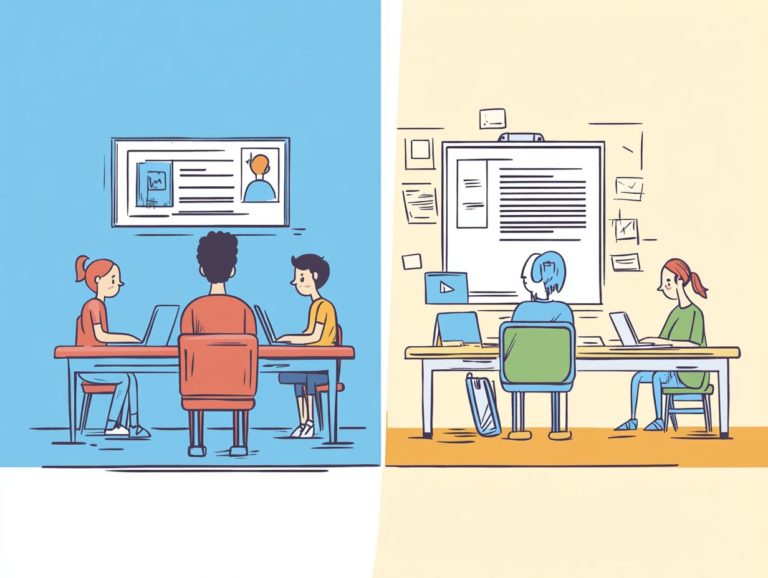How to Successfully Transition from Associate to Bachelor’s
Navigating the journey from an associate degree to a bachelor’s degree is both thrilling and intimidating. Grasping the key differences in curriculum and requirements is crucial for making an informed decision.
This article delves into the advantages of obtaining a bachelor’s degree, including enhanced career opportunities and increased earning potential, while also addressing the challenges that may arise, such as time and financial commitments.
You will find practical steps to facilitate a seamless transition and tips for balancing work and school. Get ready to elevate your education! Let s dive in!
Contents
- Key Takeaways:
- Understanding the Difference Between Associate and Bachelor’s Degrees
- Benefits of Transitioning to a Bachelor’s Degree
- Challenges of Transitioning to a Bachelor’s Degree
- Steps to Successfully Transition to a Bachelor’s Degree
- Evaluating Your Options
- Creating a Plan of Action
- Tips for Balancing Work and School
- Time Management Strategies
- Utilizing Available Resources
- Frequently Asked Questions
- What is the difference between an Associate degree and a Bachelor’s degree?
- Why is it important to successfully transition from an Associate degree to a Bachelor’s degree?
- How can I prepare for the transition from an Associate degree to a Bachelor’s degree?
- Can I transfer all of my credits from my Associate degree to a Bachelor’s degree?
- What are some challenges I may face during the transition process?
- How can I make the most of my transition from an Associate degree to a Bachelor’s degree?
Key Takeaways:
- Understand the differences in curriculum and requirements between associate and bachelor’s degrees to make an informed decision for your academic and career goals.
- Transitioning to a bachelor’s degree can lead to increased career advancement opportunities and earning potential.
- Careful planning, time management, and utilizing available resources are essential to balance work and school commitments.

Understanding the Difference Between Associate and Bachelor’s Degrees
Grasping the distinctions between an associate degree and a bachelor’s degree is essential for students as they embark on their educational journey. While both degrees play important roles in higher education, they serve different purposes and come with unique requirements that can greatly affect your career opportunities and future educational paths.
An associate degree usually requires 60 credits and can be obtained at a community college, providing a solid foundation. In contrast, a bachelor’s degree typically requires 120 credits and offers a more comprehensive academic experience with specialized program options tailored to meet the demands of various job markets.
Key Differences in Curriculum and Requirements
The curriculum and requirements for an associate degree vary significantly from those of a bachelor’s degree, influencing the skills and knowledge you acquire along your educational journey.
When you pursue an associate degree, you typically dive into focused, vocational courses (career-oriented courses) tailored for immediate entry into the workforce. This often includes hands-on training in fields like healthcare, technology, or skilled trades, preparing you for specific roles right away.
On the other hand, a bachelor’s degree offers a broader array of liberal arts (general education) and specialized courses, cultivating critical thinking, analytical abilities, and communication skills. These competencies are highly sought after by employers, and the degree you earn can have a profound impact on both your immediate job opportunities and your long-term career growth.
The differences in these educational paths affect your chances for further education. Generally, bachelor’s degree holders have greater access to advanced degrees and specialized fields, opening doors to a wider array of professional possibilities.
Benefits of Transitioning to a Bachelor’s Degree
Transitioning from an associate degree to a bachelor’s degree presents you with a multitude of benefits, including the option of transferring credits from an associate degree, that significantly enhance your personal and professional growth.
Graduates holding a bachelor’s degree frequently unlock substantial career advancement opportunities and enjoy a higher earning potential in today s competitive job market, where degree inflation is increasingly common.
Additionally, many institutions offer robust financial aid options, enabling you to pursue your educational objectives while saving significantly on tuition.
This move sets you up for a rewarding career trajectory that you can truly relish. Start your journey today and transform your future!
Career Advancement Opportunities
Obtaining a bachelor’s degree significantly enhances your career advancement opportunities in today s competitive job market. Employers increasingly prioritize candidates with advanced educational qualifications.
Positions often emerge in sectors like healthcare, engineering, and technology fields where the demand for skilled professionals is on the rise.
A bachelor s degree opens doors to entry-level roles and equips you with essential skills, such as critical thinking, effective communication, and problem-solving.
For example, if you re pursuing a role in software development, you will have a solid foundation in programming languages and project management. These skills are highly sought after by employers looking to innovate and maintain a competitive edge.
Thus, aligning your educational attainment with industry needs underscores the value of a bachelor’s education in fostering both personal growth and professional demand.
Increased Earning Potential

One of the biggest reasons to pursue a bachelor’s degree is the increase in earning potential compared to an associate degree. Research shows that individuals with a bachelor’s degree accumulate significantly more wealth over their lifetimes than those with only an associate degree, with estimates suggesting a difference exceeding $400,000.
This financial advantage is especially apparent in industries that prioritize advanced education. Fortunately, financial aid and scholarships can ease tuition fees, making higher education more accessible.
By exploring these funding options, you can enhance your earning potential and pave the way for a more stable financial future. Start researching scholarship options today!
Challenges of Transitioning to a Bachelor’s Degree
Taking the leap to a bachelor s degree can open exciting new doors for your future! However, it also presents significant challenges that can influence your educational journey.
One primary hurdle is the time commitment required to complete a bachelor’s program. Many working adults struggle with this demand, so it’s crucial to find a balance.
Financial considerations, such as tuition costs and degree inflation (when more jobs require higher degrees than before), may also dissuade you from pursuing further education, even in light of the long-term advantages it can provide.
Time Commitment and Financial Considerations
The time commitment necessary to earn a bachelor’s degree can be a formidable challenge for many students, especially those juggling work and family responsibilities.
As you navigate your busy life, you might find yourself seeking effective strategies to manage your time. Embracing the flexible schedules offered by online learning platforms can be a game-changer. This approach lets you integrate coursework into your hectic routine and refine your study techniques.
Financial considerations add another layer of complexity; tuition costs can be intimidating. It s essential to explore available options like scholarships and financial aid programs that could ease some of the financial strain associated with pursuing higher education.
Steps to Successfully Transition to a Bachelor’s Degree
Successfully transitioning to a bachelor’s degree requires a series of strategic steps, including understanding what to do after earning your associate degree, that can streamline your journey and boost your chances of academic success.
Begin by carefully evaluating your options in terms of program types and institutions that resonate with your career aspirations and lifestyle preferences. Consider if you can transfer credits from your previous studies, as this can save you time and effort, making for a more seamless transition.
Evaluating Your Options
Evaluating your options when considering a bachelor’s degree is a vital step in ensuring you choose a program that aligns perfectly with your academic and career aspirations.
As you navigate this journey, it s essential to explore various program formats, including online learning alternatives that provide greater flexibility, especially if you’re balancing work or personal commitments.
Researching different schools and their course offerings can reveal a wealth of opportunities tailored to your specific interests. Many institutions even allow the transfer of credits from previous coursework, significantly reducing both the time and financial investment needed to complete your degree.
This thoughtful consideration not only enhances your educational efficiency but also gives you the power to make informed choices that resonate with your unique path.
Creating a Plan of Action

Creating a plan of action is crucial as you transition to a bachelor’s degree; it serves as a clear roadmap for your educational journey.
By formulating a structured plan that includes well-defined timelines, measurable academic goals, and easily accessible resources for support, you can navigate the challenges ahead with increased confidence.
Set exciting milestones like completing prerequisites or setting target grades for each semester to keep you motivated and ensure steady progress.
Financial aid, or money to help pay for school, plays a vital role in this process. It significantly contributes to making education affordable and allows you to focus on your studies rather than be weighed down by financial burdens.
Incorporate time management strategies, effective study habits, and seek mentorship to further enhance your chances of success.
Tips for Balancing Work and School
Balancing work and school presents a challenge that many students navigate; yet, with effective time management strategies, it becomes entirely achievable.
As you pursue your bachelor’s degree, particularly through online learning, you can leverage flexible schedules that enable you to manage both responsibilities seamlessly.
By cultivating a structured approach to your studies prioritizing tasks and setting realistic goals you position yourself to excel academically while honoring your work commitments.
Time Management Strategies
Implementing effective time management strategies is essential for students like you who are striving to balance work and school responsibilities.
By prioritizing tasks, creating structured schedules, and utilizing digital tools, you can elevate your productivity while minimizing stress. Online calendars and productivity apps can help you streamline deadlines and assignments, ensuring that nothing slips through the cracks.
Additionally, online learning platforms offer the flexibility to engage with course materials at your own pace, allowing you to tailor your educational experience to fit your lifestyle. This adaptability not only enriches your learning journey but also harmonizes with your various commitments, fostering a healthier work-study-life balance.
Embracing these techniques can significantly boost your overall learning efficiency and academic performance.
Utilizing Available Resources
Utilizing the resources at your disposal is essential when you’re enrolled in online learning programs; it can profoundly enhance both your academic experience and career prospects.
By leveraging the various student support services provided by educational institutions, you can access valuable tools that will aid your learning journey.
- Get personalized help through tutoring to tackle tough subjects.
- Find good mentors who can guide and motivate you.
- Explore career counseling to prepare for your job search.
- Securing financial aid is equally crucial, as it alleviates the economic burden, allowing you to concentrate on your studies and fully engage with these resources.
This strategy ultimately paves the way for academic success and a brighter future.
Frequently Asked Questions
In summary, remember to evaluate your options carefully, create a structured plan, balance your responsibilities, and utilize available resources to make the most of your academic journey. Taking actionable steps now can lead to a successful future!
What is the difference between an Associate degree and a Bachelor’s degree?

An Associate degree is typically a two-year program offered by community colleges and technical schools. It focuses on basic knowledge and skills in a specific field.
A Bachelor’s degree is a four-year program provided by colleges and universities. It offers a deeper understanding of a subject and prepares individuals for higher-level positions.
Why is it important to successfully transition from an Associate degree to a Bachelor’s degree?
Moving from an Associate degree to a Bachelor’s degree opens up a wide range of opportunities. It allows for career advancement and higher salaries.
This transition also provides a sense of personal achievement and helps you stand out in the job market.
How can I prepare for the transition from an Associate degree to a Bachelor’s degree?
To prepare, research different Bachelor’s degree programs and their requirements. Ensure you complete the necessary courses for transfer and meet all admission criteria.
Speak with academic advisors and attend transfer workshops for a smoother transition.
Can I transfer all of my credits from my Associate degree to a Bachelor’s degree?
In most cases, yes, you can transfer credits from your Associate degree. However, check with the specific school and program as each institution has different transfer policies.
Some courses may not transfer, and you might need to retake them to meet requirements.
What are some challenges I may face during the transition process?
Common challenges include adjusting to a larger campus and adapting to different teaching styles. You might also feel overwhelmed or anxious about starting a new program.
With proper planning and support, you can overcome these challenges.
How can I make the most of my transition from an Associate degree to a Bachelor’s degree?
Take advantage of resources at your new college or university. Attend orientation and meet academic advisors to discuss your goals.
Get involved in campus activities to meet new people and develop skills. Manage your time effectively and seek help when needed to stay on track.
Seize this opportunity to enhance your education and future career!






